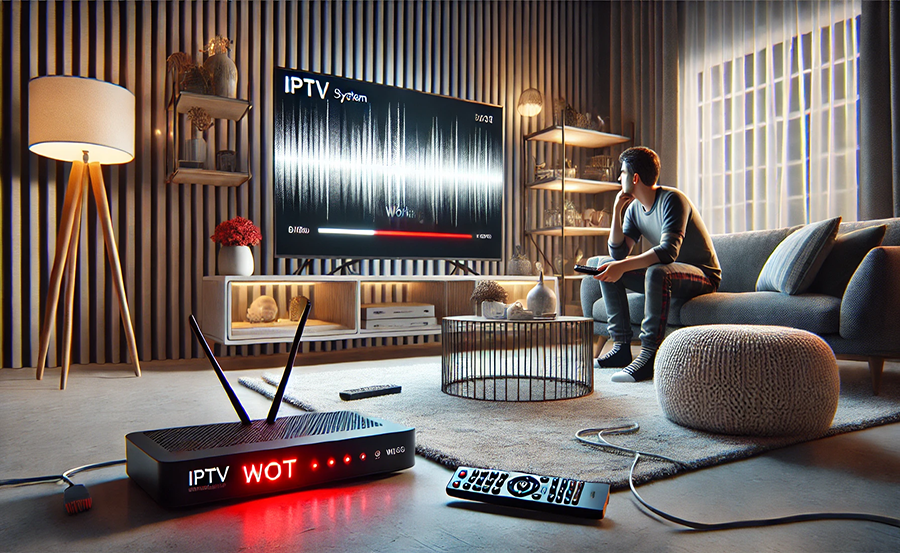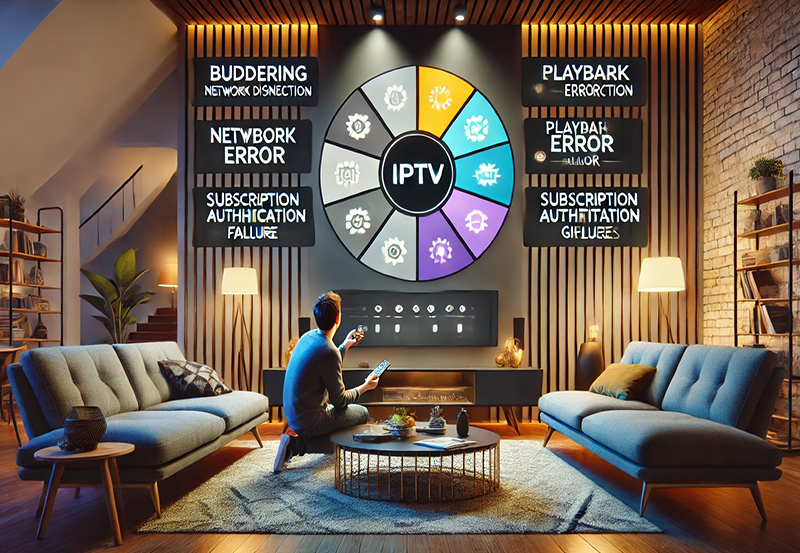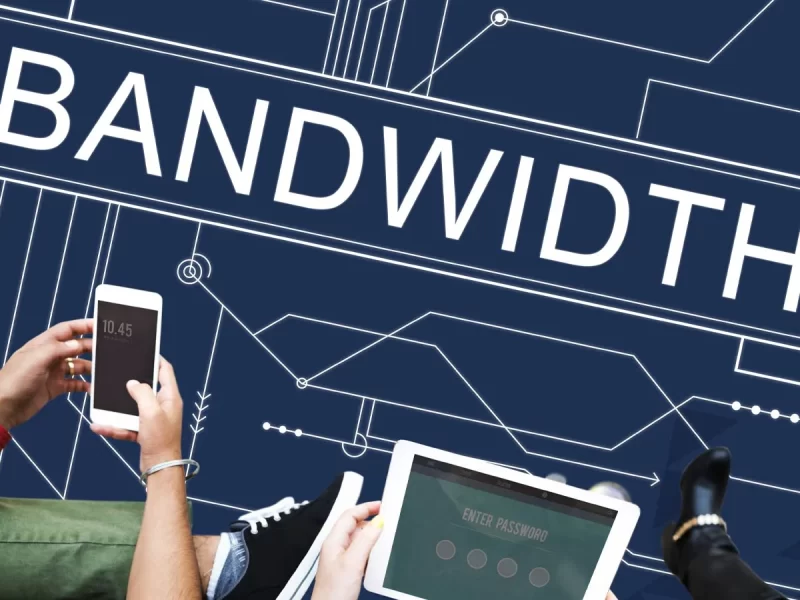Internet Protocol Television (IPTV) has revolutionized the way we access content, from sports events to our favorite TV shows, offering unparalleled convenience and variety. However, nothing disrupts the experience quite like lag. Anyone who’s been engrossed in a high-stakes game or suspenseful drama can attest to the frustration of buffering or delays. This guide aims to help users understand what causes IPTV lag and how to effectively resolve it, ensuring a smoother and more enjoyable viewing experience.
Buy 1 Year IPTV Subscription and Enjoy Unlimited Content
What is IPTV and How Does it Work?
Before we dig into the technicalities of IPTV lag, it’s crucial to grasp what IPTV actually entails and how it operates. IPTV is a service that delivers television programming and other video content via the Internet, bypassing traditional satellite or cable formats. This not only opens up a wider array of programming but also allows the ability to watch most programs on-demand.
The content is distributed using the Internet Protocol (IP) suite over a packet-switched network, such as a LAN or the Internet, instead of being delivered through traditional terrestrial, satellite signal, or cable television formats.
Key Features of IPTV
Understanding the advantages of IPTV over traditional television services can clarify why so many viewers prefer this innovative system today. Below are some of its standout features:
- On-demand content: Enjoy shows whenever you want rather than waiting for a scheduled broadcast.
- Access to a vast array of channels worldwide—not just your local coverage.
- Interactive TV services, like DVR capabilities, which allow you to pause, rewind, or record live TV.
Types of IPTV Services
When considering IPTV, it’s important to know the different types of services available. Each type has its unique set of functions tailored to user preferences and internet capabilities.
Here’s a breakdown of the primary IPTV service types:
- Live IPTV: Stream real-time television broadcasts just like traditional TV.
- Video On Demand (VOD): Access to a library of movies, series, and shows to watch whenever you wish.
- Time-shifted TV: This option allows you to view broadcasts at a later time, perfect for recording live streams.
Exploring the Root Causes of IPTV Lag
Lagging during video streaming can be caused by numerous technical and networking issues. By understanding these factors, you can begin applying solutions specifically suited to your situation.
Home Network Limitations
One major contributor to IPTV lag is the condition of the home network. This encompasses everything from your bandwidth to the quality of your router. Many users might find that their Wi-Fi signals don’t reach far enough for good connectivity to IPTV devices.
Bandwidth Issues
Bandwidth refers to the maximum rate of data transfer across a network. If multiple devices are occupying this bandwidth, it may result in increased buffering. Streaming high-definition content requires substantial bandwidth, and failure to meet these demands results in lag.
Server Overload
Another potential issue is server overload from the IPTV service provider’s end. When too many users try to access the server simultaneously, it can lead to delays as the server gets overwhelmed with requests.
Moreover, if the service provider’s infrastructure isn’t robust enough to handle a large number of users, you’ll experience disruptions more frequently.
Practical Solutions to Eliminate IPTV Lag
Now that we’ve identified potential causes, let’s focus on practical solutions that can help resolve IPTV lag. Implementing these methods may require a bit of tech-savvy but are generally steps you can take on your own.
Enhancing Your Network Setup
Improving your network setup can vastly reduce lag and improve your IPTV experience. This might include upgrading to a better router or improving your Wi-Fi signal strength with additional hardware like signal boosters or mesh networks.
Switching to a wired Ethernet connection is another strong recommendation for those experiencing wireless connectivity issues. Hardwired connections tend to be more stable and less prone to interference than wireless ones.
Managing Bandwidth Usage
Assuring your IPTV devices have preferential bandwidth can make a significant impact. While it might mean cutting down on other activities, like heavy downloads or online gaming while streaming, it ensures more bandwidth is available for IPTV.
Choosing the Right IPTV Provider
Your choice of IPTV provider can heavily influence the lag situation. Opt for service providers known for robust infrastructure and reliable customer service. Reading reviews or community feedback can guide you towards reputable options.
Regular Updates and Maintenance
Don’t overlook maintenance! Regularly updating your device’s software and clearing cache can alleviate some streaming issues. Updates frequently contain fixes for bugs that could slow down your streaming experience.
How to Deal with IPTV Compatibility Issues on Different Devices
DIY Troubleshooting Tips
Sometimes, the simplest solutions can save the day. Here are some straightforward troubleshooting methods you can try immediately.
Restart Your Devices
It might seem like a cliché solution, but restarting can resolve many temporary issues. Restart your router, streaming device, and even your TV to ensure all devices are starting fresh without memory overload.
Check For Interference
Make sure there are no electronic devices near your router that could cause interference. Microwaves, cordless phones, and other appliances can meddle with the Wi-Fi signal’s strength.
Adjust Streaming Settings
If you’re consistently experiencing lag, consider opting for a lower resolution setting on your IPTV device. It requires less bandwidth and can lead to a smoother playback if your connection isn’t optimal.
Advanced Solutions for Persistent Lag Issues
If lag continues despite your best efforts, it may be time to seek more advanced solutions. These options usually require some level of technical expertise or professional assistance.
Consider Using a VPN
Although it might seem counterintuitive, a VPN can sometimes optimize your IPTV performance by routing your connection through a more stable server path. Be cautious to choose a high-speed VPN to minimize additional slowdowns.
IPTV Box Optimization
Your IPTV box settings may need adjusting. Some boxes allow for optimization settings that can alter buffering and streaming preferences to suit your network stability.
The Future of IPTV and Streaming Solutions
As technology evolves, so too do the solutions for improved streaming. Emerging technologies promise even less disruption and more enjoyment for IPTV users.
5G Networks
The rollout of 5G networks is a boon for IPTV, potentially offering unprecedented bandwidth and network stability. As 5G becomes more widespread, the hope is that buffering and lag issues will significantly diminish.
Embrace a Lag-Free IPTV Experience
Achieving a seamless IPTV experience may require investment in better hardware, or tweaks in your network setup, but the payoff is a more enjoyable and immersive content consumption experience. By understanding the technology and potential pitfalls, you’ll be better prepared to tackle any obstacles as they arise.
FAQ Section

What are the benefits of using IPTV for sports streaming?
IPTV offers access to live sports broadcasts globally. Its on-demand feature means you can watch games across different leagues regardless of your geographic location.
How can I install IPTV on my device?
The process usually involves downloading an IPTV app from the device’s app store or marketplace, then subscribing and inputting the provider’s information. Consult your provider for specific instructions tailored to your device.
What’s a simple fix if my IPTV stream keeps buffering?
Try pausing the stream for a few moments to allow buffering to catch up, reducing the streaming quality, or checking for any network interferences.
Can too many devices on my Wi-Fi cause IPTV lag?
Absolutely. When your network is saturated with active devices, available bandwidth decreases for each, potentially causing lag during IPTV streaming.
Is IPTV a reliable option for mainstream TV consumption?
With reliable internet and a good provider, IPTV can indeed be a dependable option, offering flexible programming and numerous advantages over traditional TV.
IPTV Black Screen Fixes: Diagnosing and Solving Display Problems





